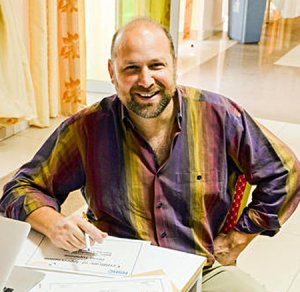The NSF-funded Network Startup Resource Center helps countries build networks and train engineers to enhance international science collaboration
 EUGENE, Ore. — (Oct. 2, 2014) — The University of Oregon’s Network Startup Resource Center has received a $3.7 million award from the National Science Foundation to help develop global Internet infrastructure.
EUGENE, Ore. — (Oct. 2, 2014) — The University of Oregon’s Network Startup Resource Center has received a $3.7 million award from the National Science Foundation to help develop global Internet infrastructure.
The five-year grant will allow the center to expand its activities building network expertise and capacity in developing countries with the objective of improving international science and education collaborations.
“In order for modern research programs to flourish in emerging international networks, there must be network infrastructure, well-trained local support, ready access to new technologies, and ongoing educational opportunities for local engineers and technologists,” said Steve Huter, the center’s director and principal investigator for the award.
Since its founding in 1992, the UO center has provided technical assistance to universities, government agencies and other organizations in developing regions of the world where inadequate connectivity poses a barrier to collaborations with U.S. scientists and educators. The new award will allow Huter and co-principal investigators Dale Smith and Hervey Allen to expand the center’s growing influence.
Funded by an initial investment from the National Science Foundation, the center has worked in more than 100 countries, helping to build some of the initial Internet infrastructure in Africa, Asia-Pacific, the Middle East, Latin America, the Caribbean and North America.
Recently, the NSRC provided on-site engineering assistance to the Charles Darwin Research Station in the Galapagos Islands, an NSF-funded research site. Engineers worked with the station to plan improvements to its existing Internet connectivity and communications infrastructure, allowing visiting researchers to more effectively collaborate with scientists around the world.
In order to address both human capacity and infrastructure improvements for the Galapagos Islands, the UO center is providing funding for two Ecuadorian network technicians from the Charles Darwin Research Station to participate in a one-week training with NSRC personnel hosted in Manta, Ecuador. After completing the training workshop in network design, monitoring and management, the network technicians will return home to lead the network upgrades.
Atmospheric science is one area that has benefitted from network upgrades like the one happening at the Charles Darwin Research Station, says Mohan Ramamurthy, director of the NSF-funded data service provider Unidata.
“Atmospheric science is data intensive,” Ramamurthy said. “The NSRC’s work to improve connectivity and communications has been invaluable to the weather and climate community in the U.S. and around the world.”
The Network Startup Resource Center is sponsored by NSF award number 1451045.
Media Contact: Lewis Taylor, 541-541-2816, lewist@uoregon.edu
Source: Steven Huter, director of NSRC, 541-346-3547, sghuter@nsrc.org
Note: The University of Oregon is equipped with an on-campus television studio with a point-of-origin Vyvx connection, which provides broadcast-quality video to networks worldwide via fiber optic network. In addition, there is video access to satellite uplink, and audio access to an ISDN codec for broadcast-quality radio interviews.